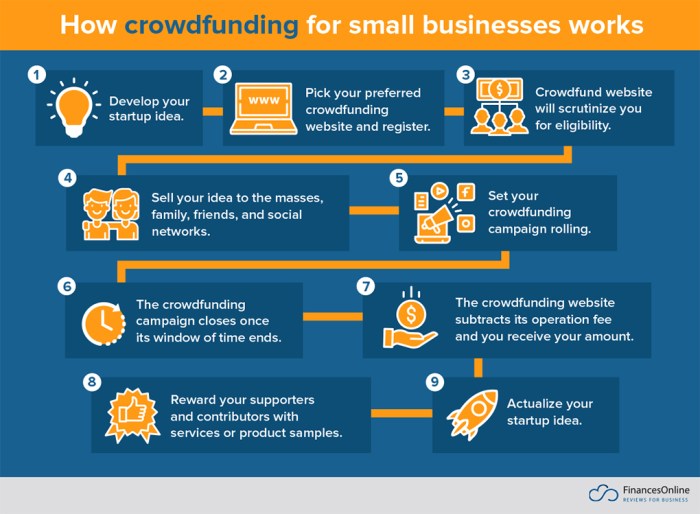
Startup funding for small businesses sets the stage for this enthralling narrative, offering readers a glimpse into a story that is rich in detail with casual formal language style and brimming with originality from the outset.
Startup funding is crucial for the growth and success of small businesses, providing the necessary financial support to turn innovative ideas into reality. In this guide, we will explore the various sources of funding, the challenges faced by small businesses, and the different avenues available for securing funding.
STARTUP FUNDING

Startup funding refers to the financial support that new businesses require to launch and grow their operations. Securing adequate funding is crucial for startups to cover initial costs, support product development, and sustain operations until they become profitable.
Sources of Startup Funding
- Personal savings: Entrepreneurs often invest their own money into their startup to kickstart the business.
- Angel investors: Individuals who provide capital in exchange for ownership equity or convertible debt.
- Venture capital: Venture capital firms invest in startups with high growth potential in exchange for equity.
- Crowdfunding: Platforms like Kickstarter allow startups to raise funds from a large number of people.
- Bank loans: Traditional bank loans can provide startups with the necessary capital to fund their operations.
Importance of Securing Adequate Funding
Securing adequate funding is essential for startups to cover operating expenses, hire talent, invest in marketing, and expand their business. Without sufficient funding, startups may struggle to grow and compete in the market.
Challenges in Accessing Startup Funds
- Lack of collateral: Many small businesses struggle to secure traditional bank loans due to a lack of collateral.
- High risk: Startups are considered high-risk investments, making it challenging to attract investors or lenders.
- Market competition: With limited resources, startups face fierce competition for funding from other businesses in the market.
- Complex application processes: Applying for funding can be time-consuming and complex, deterring some startups from pursuing financial support.
Types of Funding

Debt financing and equity financing are two common methods for startups to raise capital. Bootstrapping is another approach where entrepreneurs use their own resources to fund their business. Crowdfunding has become a popular way for small businesses to secure funding from a large number of individuals. Government grants provide another avenue for startups to access capital.
Debt Financing vs. Equity Financing
Debt financing involves borrowing money that needs to be repaid with interest, while equity financing involves selling a stake in the company in exchange for capital. Debt financing allows the business to retain ownership but comes with the obligation to repay the loan. Equity financing dilutes ownership but does not require repayment, and investors share in the company’s success.
Bootstrapping
Bootstrapping is a method where entrepreneurs use their personal savings, credit cards, or revenue from early sales to fund their business. This approach allows founders to maintain full control over their company and avoid taking on debt or giving up equity to investors.
Crowdfunding
Crowdfunding platforms enable entrepreneurs to raise funds from a large number of individuals who contribute small amounts of money. This method not only provides capital but also helps validate the business idea and build a community of supporters. Crowdfunding can be reward-based, donation-based, equity-based, or debt-based.
Government Grants
Government grants are non-repayable funds provided to startups by government agencies or organizations. The process of applying for government grants typically involves submitting a detailed proposal outlining the business idea, the intended use of funds, and the expected outcomes. Grants are competitive and may have specific eligibility criteria and reporting requirements.
ANGEL INVESTORS AND VENTURE CAPITALISTS

When it comes to funding for startups, angel investors and venture capitalists play crucial roles in providing the necessary financial support. Let’s delve into the key differences between these two types of investors and understand their expectations and implications for startups.
Angel Investors vs. Venture Capitalists
Angel investors are typically high-net-worth individuals who invest their personal funds in early-stage startups in exchange for equity ownership. On the other hand, venture capitalists are professional investment firms that manage pooled funds from various sources, including institutions and high-net-worth individuals, to invest in startups and emerging companies.
Examples of Successful Startups Funded by Angel Investors
- Uber: Angel investor Chris Sacca made an early investment in Uber, which turned out to be highly successful.
- Dropbox: The cloud storage company received funding from angel investors, including Y Combinator.
Expectations of Angel Investors and Venture Capitalists
- Angel Investors: Angel investors often provide mentorship and guidance along with funding. They expect a high return on investment and are usually more involved in the startup’s operations.
- Venture Capitalists: Venture capitalists look for high-growth potential and scalability. They expect a significant equity stake in the company and aim for a successful exit through acquisition or IPO.
Benefits and Drawbacks of Partnering with Angel Investors or Venture Capitalists
- Benefits:
Access to networks and expertise, mentorship, and strategic guidance.
- Drawbacks:
Loss of control, pressure for rapid growth, and potential conflicts of interest.
BUSINESS INCUBATORS AND ACCELERATORS
Business incubators and accelerators play a crucial role in providing funding and support for startups, helping them grow and succeed in the competitive business landscape. These programs offer resources, mentorship, networking opportunities, and sometimes funding to help startups develop their ideas and scale their businesses.
Success Stories of Startups
- One success story is Dropbox, which went through the Y Combinator accelerator program. Dropbox received mentorship, funding, and access to a network of investors, which helped the company grow into a multi-billion dollar business.
- Another example is Airbnb, which participated in the 500 Startups accelerator program. Through this program, Airbnb received valuable guidance and connections that contributed to its rapid growth and success in the travel industry.
Application Process for Business Incubators or Accelerators
- Startups typically apply to join a business incubator or accelerator by submitting an online application detailing their business idea, team, and market potential.
- Selected startups are invited for interviews or pitch sessions to further assess their suitability for the program.
- Once accepted, startups receive mentorship, access to resources, and sometimes funding to help them grow their businesses.
Differences from Traditional Funding Sources
- Business incubators and accelerators provide more than just funding; they offer mentorship, guidance, and access to valuable networks, which traditional funding sources may not provide.
- While traditional investors like angel investors and venture capitalists focus mainly on financial returns, business incubators and accelerators are more invested in the long-term success of the startups they support.
In conclusion, navigating the world of startup funding for small businesses can be complex yet rewarding. By understanding the different options available and the potential pitfalls, entrepreneurs can make informed decisions that pave the way for sustainable growth and success.
FAQ Summary
How can small businesses access startup funding?
Small businesses can access startup funding through various sources such as angel investors, venture capitalists, loans, crowdfunding, and government grants.
What are the key differences between debt financing and equity financing?
Debt financing involves borrowing money that needs to be repaid with interest, while equity financing involves selling a stake in the company in exchange for funds.
How do angel investors and venture capitalists differ?
Angel investors are typically individuals who invest their own money in startups, while venture capitalists manage funds from multiple investors and invest in startups with high growth potential.
What is the role of business incubators and accelerators in startup funding?
Business incubators and accelerators provide funding, mentorship, and resources to help startups grow and succeed in a competitive market.
Is bootstrapping a viable option for startup funding?
Bootstrapping, which involves funding a business using personal savings and revenue, can be a viable option for startups that want to maintain control and avoid external investors.





